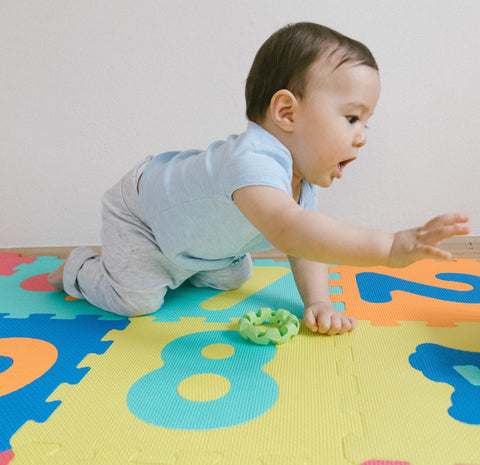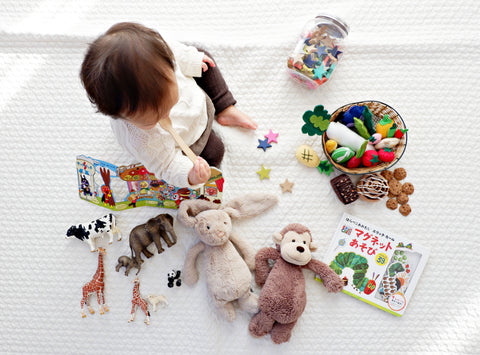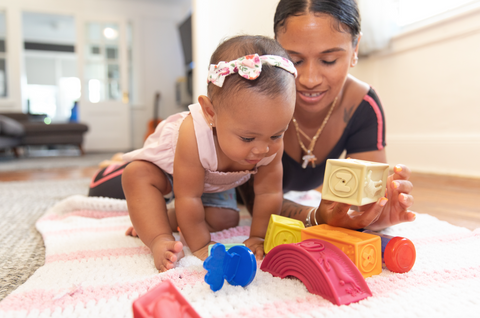Your Cart is Empty
Shop
Collections

Tummy Time Activities for Babies: Fun Ideas for Your Baby's Development
October 06, 2023 6 min read
What Is Tummy Time?
You've probably heard the term "tummy time" tossed around in conversations with other parents or read about it in parenting books. But what exactly is tummy time, and why is it so important? Essentially, tummy time is when your baby spends time lying on their stomach while awake and supervised. It's a simple, yet crucial activity that plays an integral role in your baby's development.

In the early months of your baby's life, tummy time activities for babies serve as an essential form of exercise that helps strengthen their neck, shoulder, and core muscles. Tummy time also aids in the development of motor skills and helps prevent the flattening of the back of your baby's head, a condition known as positional plagiocephaly.
It's not just about physical development, though. Tummy time also provides your child with a novel perspective of their surroundings, stimulating their curiosity and sense of exploration. It's a foundation for their cognitive development and growth.
The Importance of Tummy Time for Babies
1. Set Milestones in Motion
Why is tummy time so significant for your little one? For starters, it helps build the strength and coordination needed for key developmental milestones, like rolling over, sitting up, and crawling. Engaging in regular tummy time activities for babies can also improve your baby's hand-eye coordination and enhance their fine motor skills as they learn to reach and grasp for toys.

2. Bonding Bliss
But the benefits of tummy time extend beyond physical development. It also provides a great opportunity for you to bond with your baby. By getting down on their level, you're entering their world and engaging with them in a very direct, meaningful way. This can help foster feelings of security and attachment in your baby, which is crucial for their emotional well-being.
3. Combat Flat Head Syndrome
Lastly, tummy time is a preventative measure against flat head syndrome. Since the American Academy of Pediatrics (AAP) began recommending that babies sleep on their backs to reduce the risk of SIDS, there has been an increase in flat head syndrome. Tummy time counteracts this by relieving pressure on the back of the head and promoting a rounded skull shape.

When to Start Tummy Time
When it comes to tummy time, the earlier you start, the better. The AAP recommends starting tummy time from the day your baby comes home from the hospital. In the early days, you can try doing tummy time two to three times a day for about three to five minutes at a time. Even a few minutes a day in the beginning can be beneficial and help your baby get used to being in this position.
As your baby grows stronger and more comfortable with the activity, you can gradually increase the duration. By the seventh week, your daily sessions could last up to thirty minutes, depending on your baby's response.
How to Start Tummy Time for Beginners
1. Find the Right Surface
If you're wondering how to kick off tummy time activities for your newborn, don't fret. Start by placing your baby on a clean, flat surface like a play mat or a blanket. You can also lie down and place your baby on your chest, which can make the experience more comforting and enjoyable for them. Remember, it's crucial to make sure your baby is awake and alert during tummy time and to never leave them unattended.

2. Engage with Props
To make tummy time more engaging, you can place colorful toys or a mirror within their reach. Singing songs, making funny faces, or using a rattle can also help keep your baby entertained and distracted.

3. Patience and Persistence
In the beginning, your baby might not seem too thrilled with tummy time. That's perfectly normal. It's a new experience, and like any new skill, it takes some getting used to.
Tummy Time Activities by age
Tummy Time Ideas: Newborns
Newborns require a gentle introduction to tummy time. Starting with short, 3-5 minute sessions can help your baby get accustomed to this new position. Placing your newborn on your chest while you're lying down can be a comforting way to initiate tummy time. This not only helps them strengthen their neck muscles as they lift their head to look at you, but also promotes bonding.

Tummy time for newborn babies can also involve the use of a tummy time mat or a soft blanket on the floor. You can surround your baby with visually stimulating toys or objects, encouraging them to lift their head and supporting the development of their neck and shoulder muscles.
Remember, interaction is key during tummy time. Engage with your baby, talk to them, make eye contact, and use this time to deepen your connection with your newborn.
Tummy Time Ideas: 0-2 Months
During the first two months, your baby will be slowly building their strength. At this stage, tummy time activities can still involve lying on your chest. This position allows them to hear your heartbeat, a familiar sound that can soothe and relax them.

Focusing on comfort and familiarity in this stage. Engage in gentle interaction, talking softly or singing to create a soothing atmosphere.
Tummy Time Ideas: 2-4 Months
By the time your baby is between 2-4 months old, they will have gained more control over their neck muscles. This is a great time to introduce sensory exploration.
Try placing colourful, textured toys just out of your baby's reach during tummy time. This can stimulate their senses and awaken their curiosity, hence laying the groundwork for motor skills development.

Tummy Time Ideas: 4-6 months
At 4-6 months, your baby's strength and coordination will have improved significantly. This is a great time to introduce tummy time toys that encourage exploration and movement.
You could use a ball or a toy that moves to encourage your baby to reach out or even start crawling. Musical toys can also be a great way to stimulate your baby's senses and keep them interested in tummy time.

Featured: The Wee Bean's Fair-Trade Rattle Doll and Soft Activity Blanket
Incorporate soft cushions or small pillows to support your baby as they learn to push up and roll over. This period is crucial for building the strength needed for the upcoming milestones of sitting and crawling. More importantly, this provides your baby with opportunities to explore and learn about their environment.
You can also start introducing tummy time mats with engaging and sensory-stimulating features. Look for mats with bright colours, different textures, and interactive elements like mirrors or squeaky toys.

Featured: Amazon's Play Mat for Tummy Time
Tummy Time Ideas: 6 months+
Once your baby is 6 months old and beyond, they will likely be more mobile and active. At this stage, tummy time can become more dynamic. You can try activities that involve more movement, such as rolling a ball back and forth or playing 'peek-a-boo' around a piece of furniture.
Toys that promote fine motor skills, such as stacking blocks or toy phones, can also be incorporated into tummy time at this stage. These activities not only keep your baby entertained but also help in developing their hand-eye coordination.

What to Do If Your Baby Hates Tummy Time: Tips and Tricks
It's not uncommon for babies to resist or even downright hate tummy time. It's a new and challenging experience, after all. But don't worry, there are plenty of tips and tricks you can use to make tummy time more enjoyable.

First, try to make sure your baby is not tired or hungry when you start tummy time. A comfortable baby is more likely to enjoy this activity.
Second, get down on the floor with your baby. Your presence can offer comfort and reassurance. Engage with your baby during this time, play with them, sing songs, or simply talk to them.
Lastly, try to incorporate tummy time into your daily routines. This could be after a diaper change or before bath time. By making tummy time a regular part of your baby's day, they'll become more accustomed to it and may even start to look forward to it.
Recommended Gear for Tummy Time
While you don't necessarily need any special gear for tummy time, certain items can make the activity more comfortable and engaging for your baby.
A tummy time mat offers a soft and safe surface for your baby to play on. Many are designed with bright colours and interactive features that can stimulate your baby's senses and keep them entertained.
Tummy time toys can also add an element of fun to the activity. Look for toys that encourage your baby to reach, grasp, and explore.
A tummy time mirror can also be a great addition to your baby's routine. Babies are fascinated by their own reflection, and a mirror can keep your baby entertained and engaged for longer periods of time.

Conclusion: Developing Your Baby Through Tummy Time Activities
Tummy time is more than just a way to break up your newborn's day. It's an essential activity that aids in your baby's physical, cognitive, and emotional development. From strengthening their neck and shoulder muscles to fostering a sense of curiosity and exploration, the benefits of tummy time are immense.
Remember, each baby is unique and will progress at their own pace. Don't be discouraged if your baby seems resistant at first. With patience, consistency, and the use of fun and engaging tummy time activities, your baby will soon start to enjoy this important part of their daily routine.
Engage your baby in tummy time today, and watch them grow, develop, and reach their milestones with confidence.
Leave a comment
Comments will be approved before showing up.
Also in Latest Blog Posts

Natural Remedies For Baby Eczema: What Every Parent Should Know
December 07, 2024 5 min read
Skin conditions in babies are pretty common, with 65% of baby eczema cases occurring among babies below a year old. Since you want to protect your child, the first step is knowing the symptoms of eczema, the common triggers, and what to expect after diagnosis.
Read More
Remi's Skin Journey: Overcoming Challenges and Finding a Positive Mindset
November 25, 2024 2 min read
Read MoreRecently viewed products
Sign up to get 15% OFF your first order
Sign up to get the latest on sales, new releases and more …






